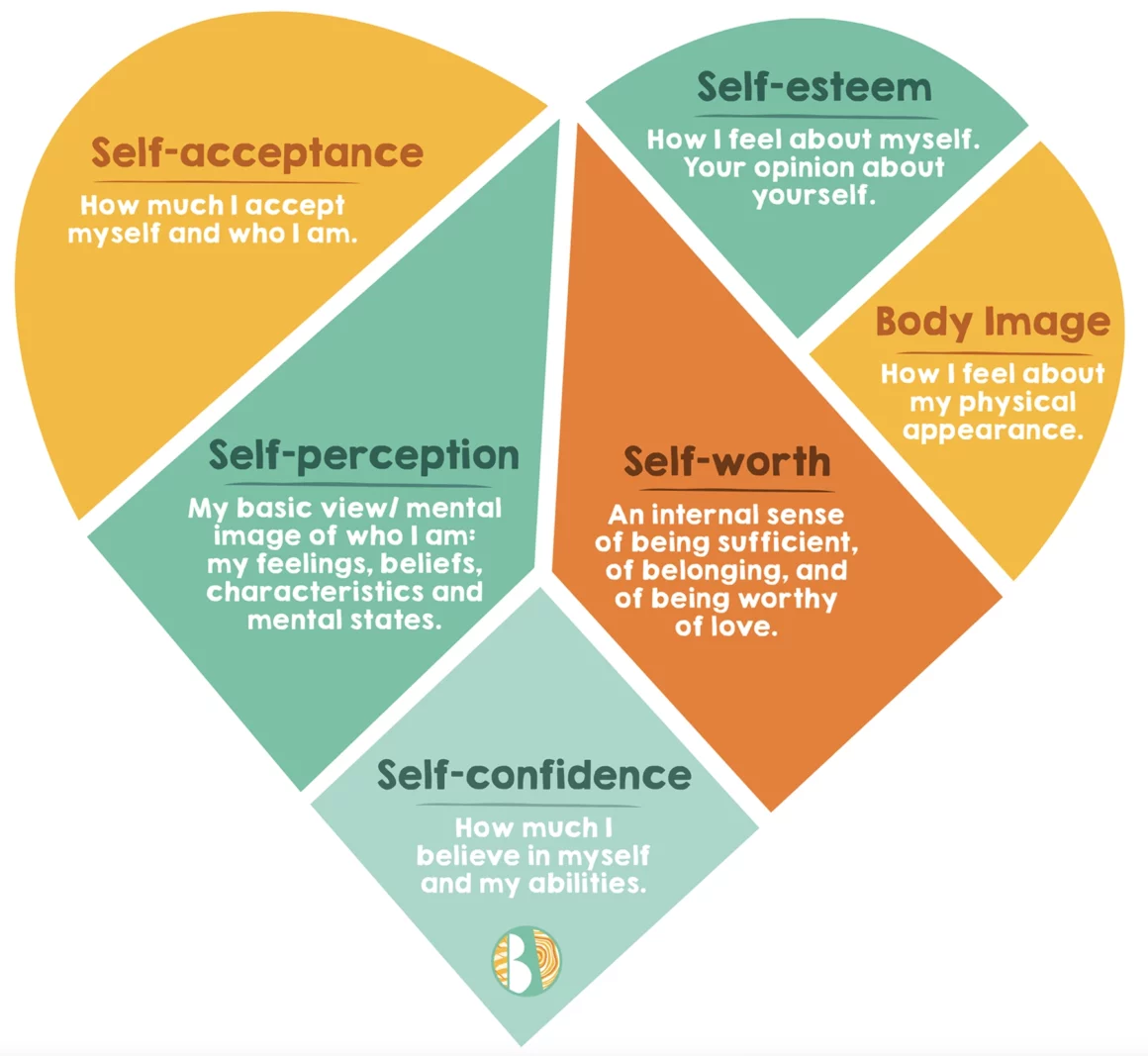Is your teen struggling with their self-worth and body image? Here are common causes of low self-esteem in adolescence and how to support your teen.
Your teen might experience some self-esteem issues in early adolescence, even if they were highly confident as children. The changes they experience during puberty can lead to self-consciousness and insecurity, and both are intensified by comparisons with peers. They are at an age where they are trying to figure out who they are; it’s hard to feel confident in yourself if you’re not sure who that is!
What Is Self-Esteem, Exactly?
Self-esteem (how preteens and teens feel about themselves) has a huge effect on their mental health and behavior. People with healthy self-esteem are self-aware, practical, and seek out people who accept and value them for who they are.
Your self-esteem is about how much you believe yourself to be worth, and about how much you believe others appreciate you. A healthy sense of self-esteem often helps people to feel more in control of their life and to be aware of their strengths and limitations.
As they grow, preteens and teens’ self-esteem and confidence can be influenced by many factors, including:
- The actions and behaviors of others
- The media
- How they fit into society and how society views then
- Their childhood and life experiences (how they grew up and how they were raised)
- Their relationships
- Their personality
- Their sexuality
- Their gender identity
- Their culture
- Acts of abuse and trauma
- Racism, sexism, homophobia, white supremacy, patriarchy, ableism, and other forms of discrimination

9 Ways to Help Increase Self-Esteem in Teens
While healthy self-esteem and a strong sense of self-worth can seem elusive during puberty, they’re necessary for mental health. Good self-esteem develops as teens try new things, solve problems, take risks, and move through failure.
The more your teen can accept themselves and believe in their inherent value, regardless of their achievements or performance, the more stable they’ll feel, which will help them deal with life’s discouragements and disappointments.
As a parent or caregiver, you can have a huge impact on your teen’s self-image. Here’s how to cultivate an environment that promotes self-worth, without criticism and shame.

Ready to elevate your parenting? Become a member of the BLOOM family today!
Gain access to workshops, coaching, and a network of supportive parents. Don’t navigate this journey alone –
1. Work on Your Self-Image
The more you model healthy self-esteem and mental health for your teen, the more likely they’ll be to recognize it in friends, potential romantic partners, and to sense it in themselves.
2. Empower Them to Try Something New
Even if they don’t like the new cuisine, aren’t the first to feel comfortable in social situations, or aren’t an immediate pro at the new hobby, research shows that novelty can foster curiosity, openness, and feelings of happiness.
3. Encourage Them to Set Achievable Goals
Attainable goal setting will keep them from feeling overwhelmed, a stressful state can lead to negative self-talk and esteem issues.

4. Help Them Learn From Mistakes And Celebrate Successes
Rather than criticize stumbles, which might have a negative impact on low self-esteem in teens, play out how a different path may have changed the outcome.
5. Support Their Passions
You might not be able to sign them up for every hobby or sport their school offers, but finding small ways to show that you’re invested in the person they’re becoming will go a long way.
6. Support a Positive Body Image
For many preteens and teens, body image and self-esteem are deeply connected. The media, culture, and society tell them how they “should” look — an often-distorted and unrealistic image.
These false perceptions can create or enhance negative thoughts about their appearance and can cause feelings of self-consciousness, shame, and isolation. In turn, these feelings can lead to social anxiety, depression, and eating disorders.
Teach them to see their body as a capable and strong whole, rather than made of individual parts that they may or may not like. Focus on what their body can do and accomplish versus how it looks: Instead of complimenting them for being “pretty,” try “strong.”
7. Promote a Healthy Diet and Exercise
Provide your teen with nutritious meals and encourage them to be physically active. Remind them that exercise and a balanced diet are essential for growth and development of the mind and body. Foster a positive relationship around foods that are nutritious and provide their body with fuel to not only grow, but give them energy, a positive mood, mental clarity, and prevent disease.
8. Be Mindful About Media
Think of what your teens watch, monitor their social media use, and read along with the products they purchase and the messages these choices send. Talk about self-image and a healthy body, including talking about distorted images and messages that media and social media can portray.

9. Affirm Diversity and Inclusion
Cultural, racial, ethnic, gendered representations of children in books, images, media, art, teachers, etc., help foster and affirm positive self-esteem, especially for Black people and people of color.
Signs Your Teen Might Need Help With Self-Esteem
There are several red flags you can look for if you think your teen needs help with their body image or self-esteem.
A 2020 study published in The Journal of Eating Disorders found that the following signs might mean your teen needs help or is struggling with their mental health (e.g., self-esteem, body image, self-worth).
- Dramatic shifts and changes in their eating habits
- Social isolation
- Loss of concern for and interest in daily normal activities
- Changes in a youth’s personality — especially if they become more aggressive, withdrawn, and/or angry
Other red flags which might indicate depression and anxiety include:
- Tears and excessive moodiness
- Irritability and anger
- Extreme sensitivity to criticism
- Shifts in patterns of sleep
- Suicidal thoughts
- Self-harm (especially cutting)
- Dramatic weight loss or gain
- Feelings of helplessness or worthlessness
It’s also important to watch out for body image issues, unexplained pains and aches, social isolation and peer group abandonment, secrecy, and isolation from members of the family.
Is your teen experiencing anxiety? Learn how to help them with their anxiety and other mental health concerns.
Parenting can leave you feeling overwhelmed and alone, but at BLOOM you have a community ready to help. Access Live and On-Demand Workshops featuring our trusted experts. Get answers to your pressing questions through our Ask the Expert Platform. Find strength by joining our Community Group and connecting with fellow parents and caregivers. If you need more tailored support, take advantage of our 1-on-1 Parent Coaching Sessions. Raising tweens and teens is hard, but with BLOOM by your side, you don’t have to do it alone.
